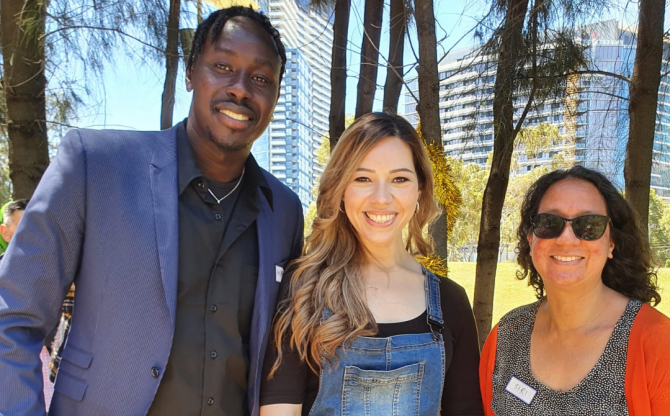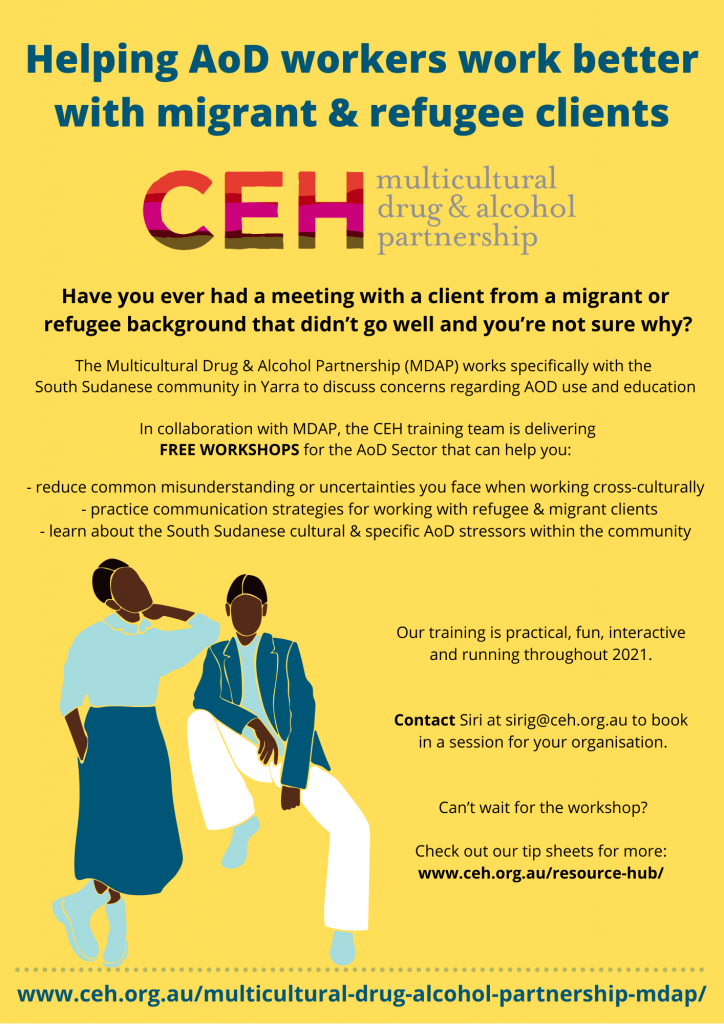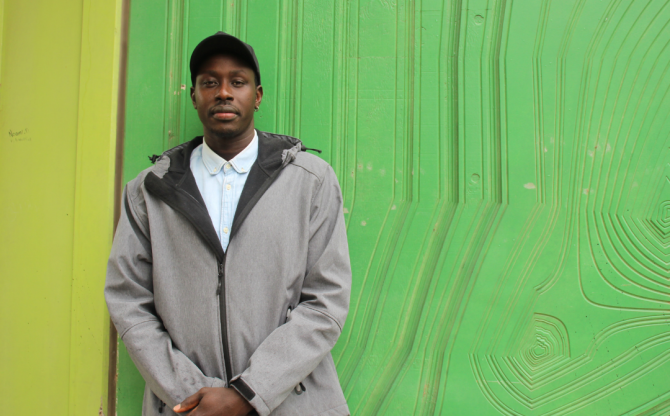In this edition of our CEH Training Blog with Eman, I’m hoping to help you understand the South Sudanese community better by interviewing one of our amazing bicultural professionals, Anyaak Abiel.
Anyaak has spent the past couple of years working with the South Sudanese community as a drug and alcohol worker as part of our Multicultural Drug & Alcohol Partnership, and more recently has moved to a new position as a Youth Worker at Youth Support + Advocacy Services (YSAS). Anyaak is also studying a Bachelors of Criminology, majoring in Psychology!
I thought many of you might be interested to find out how Anyaak thinks organisations can improve how they work with the South Sudanese community. So I organised some time to chat with him during our recent end of year party. As we both come from cultures where food is important, Anyaak and I started our chat by swapping treats.
Here’s what we discussed AFTER we exchanged dates and decadent chocolate truffles.

Left to right: Anyaak Abiel, Eman Al-Dasuqi (CEH Trainer), Siri Gunawardana (CEH Capacity Buiding Co-ordinator)
Eman: I know you’re working with the South Sudanese community members to reduce harm caused by drug and alcohol addiction. What is the most rewarding part of doing this work?
Anyaak: I’ve found ‘bridging and filling the gap’ to be the most rewarding part of my work. Both between the community and organisations and between generations in the community.
There’s a gap between my South Sudanese community and organisations. We run cultural competence training to help them understand that shame and stigma around drug and alcohol addiction is rooted deeply in my culture.
We educate organisations about our values, needs, culture and history, so they’re able to understand and work better with our community.
There’s also the gap between the people who struggle with drug and alcohol addiction and their family members. We promote shared understanding and build support systems within families in the community.
It’s a process, but I love watching uncles and aunties realise that having a younger family member they love struggle with drug addiction does not mean that they are bad. We educate them about environmental factors that can lead younger people to addiction, and how they need to be understood and not judged.
These aunties and uncles showed a willingness to adapt to the Australian environment to learn how to effectively support their loved ones born here, while also passing on their culture. And I love training and engaging with young people and empowering them with knowledge and skills.

Left to Right: Multicultural Drug & Alcohol Partnerhsip team Orlando Green, Sophie Dutertre, Emmanuel Bakheit, Anyaak Abiel, Yom Maker and Deng Lual.
Me: What are the key messages you would like to share about working and engaging with people from the South Sudanese community?
Anyaak: The South Sudanese community has a strong sense of their cultural identity, but at the same time we have different tribes, languages, dialects and faiths in the community as well, so it’s important to remember that.
At first it might look challenging to engage, but from my perspective, once I get to know you I will let my guard down and treat you like a close friend or family member. So building rapport with the South Sudanese and establishing a trusting relationship is important.
Another thing to understand is that shame is associated with certain behaviours, so you need to be mindful of how the community sees an issue while interacting among themselves and with you.
Me: MDAP is a pilot program. What do you think went well and what improvements or follow up programs would you like to see continuing?
Anyaak: What works really well for MDAP is having bicultural workers. By employing people like myself who speak several languages, it really helped us to get to the bottom of things and address certain issues effectively. Someone who is not from within the community will not understand the depth of the issues and how to realistically tackle them.

Me: Tell me about your goals and wishes for 2022.
Anyaak: My goal for 2022 is to graduate from my studies, work more and hopefully visit some of my family in South Sudan by the end of the year 😊
Me: Amen to all of that! How do I say thank you and good luck in South Sudanese?
Anyaak: yin chaleesh, ku Nhialiic ke yin
Meaning I thank you and God be with you.

